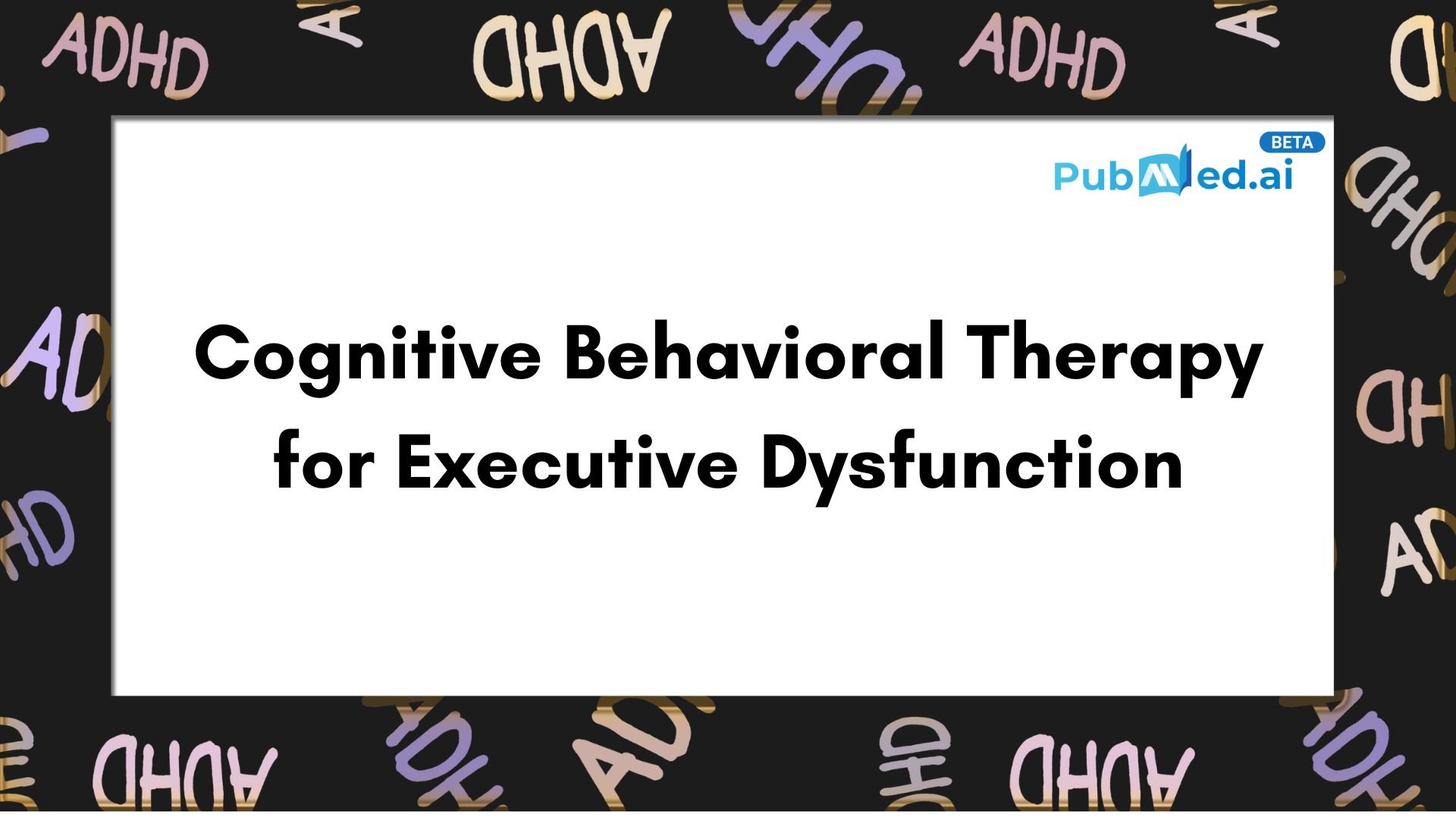What Is Cognitive Behavioral Therapy for Executive Dysfunction?

Cognitive Behavioral Therapy (CBT) is a structured, evidence-based treatment for conditions such as anxiety, depression, and ADHD. However, CBT requires patients to use executive functions such as planning, working memory, attention shifting, and self-monitoring. When these functions are impaired, therapy can be less effective.
What Is Executive Dysfunction?
Executive dysfunction is not a formal diagnosis. It describes difficulties in brain processes that control goal-directed behavior, mainly involving the prefrontal cortex and its connected networks.
Common clinical signs include:
- Difficulty initiating tasks — Trouble starting even simple activities.
- Working memory problems — Forgetting instructions or goals during tasks.
- Poor cognitive flexibility — Difficulty changing strategies when current ones fail.
- Emotional control problems — Outbursts or withdrawal when routines break down.
Executive dysfunction frequently occurs with ADHD, depression, traumatic brain injury, or neurodegenerative diseases. Because symptoms are subtle, they are often misinterpreted as a lack of motivation.
How Does CBT Work and Why Can It Be Challenging for People With Executive Dysfunction?
CBT helps patients recognize and change distorted thinking patterns. It assumes patients can monitor their thoughts, complete therapy exercises, and apply strategies consistently.
When executive functions are impaired, patients may not track their progress, remember session content, or follow through with homework. Standard CBT protocols do not always account for these difficulties, so therapy must often be adjusted.
For more research summaries, see CBT treatment studies on PubMed.ai.
What Does Research Show About CBT Outcomes in People With Executive Dysfunction?
Studies show mixed results:
- Older adults with cognitive decline sometimes benefit less from standard CBT formats (Areán et al., 2010, PubMed; Barch et al., 2016, PubMed).
- Patients with major depressive disorder and executive deficits may have trouble completing therapy assignments (Porter et al., 2017, PubMed).
- ADHD-focused CBT protocols designed to target executive dysfunction, such as those by Mary V. Solanto, PhD (Solanto, 2011, book at Oxford University Press), often produce good outcomes.
Other studies indicate that CBT effectiveness remains high when therapists simplify sessions, add reminders, and repeat core skills more frequently. Executive dysfunction does not prevent improvement, but therapy may require more time or modified methods.
How Can Clinicians Adapt CBT for People With Executive Dysfunction?
Evidence and clinical experience suggest these adjustments:
- Break therapy tasks into smaller steps and confirm understanding before sessions end.
- Use reminders, alarms, or digital planners to reduce reliance on working memory.
- Rehearse core CBT skills more often to strengthen retention.
- Combine CBT with medication when ADHD or mood disorders interfere with attention.
- Modify environments to minimize distractions and support consistent behavior.
FAQs
What is cognitive behavioral therapy for executive dysfunction?
It is CBT that is structured and paced to help individuals who have problems with planning, organization, and follow-through.
Does executive dysfunction make CBT less effective?
It can, but therapy adjustments such as simplifying content and using reminders usually restore effectiveness.
What other treatments are used for executive dysfunction?
Medication, occupational therapy, neurofeedback, and executive skills training are often combined with CBT.
Are there self-help tools for CBT and executive dysfunction?
Yes. Books, therapy workbooks, and guided apps provide structured CBT exercises tailored for people with executive deficits.
How do clinicians assess executive dysfunction?
They use neuropsychological tests, structured interviews, and behavioral assessments to evaluate working memory, flexibility, and planning.
Looking for Reliable Research Summaries? —— PubMed.ai
If you need quick access to peer-reviewed studies on CBT and executive dysfunction, try PubMed.ai. It lets you:
- Search biomedical literature efficiently
- Summarize key findings in seconds
- Generate structured research reports for academic use
Whether you’re a clinician, student, or researcher, PubMed.ai helps you save time and stay current with the latest evidence.
Disclaimer:
This AI-assisted content is intended for academic reference and informational purposes only and does not constitute medical advice, diagnosis, or treatment. Always consult qualified healthcare professionals regarding any medical condition or treatment decisions. All risks arising from reliance on this content are borne by the user, and the publisher assumes no responsibility for any decisions or actions taken.

Have a question about biomedical research or published clinical studies? PubMed.ai helps you explore published biomedical literature with AI assistance.
Subscribe to our free Newsletter